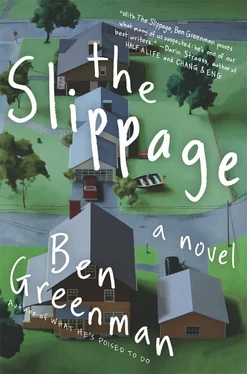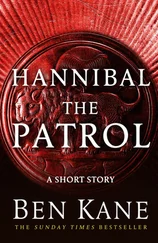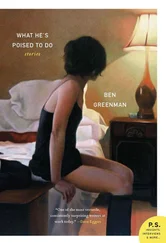At first, it was just William and Tom watching the show, which meant it was mostly Tom holding forth. “It’s strange to see the news report of the arsons long after the fact,” he said. “Fire’s supposed to be something primal, but this puts it on a delay, which is also a remove. It’s like Mark Twain said: ‘Words are only painted fire; a look is the fire itself.’ In a way, you wish the cameras would just get there and shoot the fire as it burns. Or that someone would put a camera in the fire even before it starts.” He had raced through a pair of beers. “There should be a whole channel devoted just to that. I’d watch it all the time.” William thought of mentioning the fire graphs he’d found in Tom’s studio, but he caught himself before he did.
When the special broke for a commercial, Louisa joined them. She perched on the edge of the armchair and watched silently as happy children clambered into the new family car. “Hey,” she said. “Does anyone want pizza? I’ll order.”
“Sausage,” Tom said, and she went to call in the order. After she left, Tom said, “She doesn’t seem to hate you as much these days.”
Tom was wrong: she didn’t seem to hate him at all. The floor plan in the pin-up room had restored him to her good graces. “You know what else?” Tom said. “I was reading around in Latin and I found the original for ‘Out of the frying pan, into the fire.’ De calcaria in carbonarium . It’s Tertullian. He was also the first one to explicitly formulate the idea of the Trinity. Oh, and he praised the unmarried state as the highest state of man. I don’t like his reasoning, celibacy and all, but you can’t argue with the conclusion.”
“News is back,” Louisa said, resurfacing to rescue William. The female anchor, cool in considered blue, reviewed the timeline, gave tips for reporting leads, warned against taking suspicious figures lightly. The camera panned to the commissioner, parked massively behind a tiny desk. “Pay attention, as well, to the crowd,” he said. “People gather to watch a fire, and sometimes the arsonist himself is among them. I use the masculine pronoun because that is, more often than not, the case.” A short feature on Karim followed: though most of the investigators did not think Birch Mutual was the work of the same man, Karim’s was still the only death, and so, however imprecisely, he was the face of the problem. Tom stood up and showed the way he’d run, legs almost straight like stilts, and Louisa put a hand over her mouth and asked him to stop.
Tom’s clowning, Louisa’s horror: between them, William took the role of analyst. There was one car that caught his eye, a black Pontiac with a decal on the back; he’d spotted it in the reports about two different fire sites, the marina and the nursing home. “Maybe that’s something,” he said. “You heard the fire commissioner. People gather to watch a fire, sometimes the arsonist among them.”
“That seems unlikely,” Louisa said. “A guy sets a fire and then comes back to rubberneck?”
“That would be like me going to my own art opening,” Tom said.
“You do go to your own art opening,” William said. “I should call this in.”
Louisa lifted a slice of pizza emphatically. “It probably belongs to one of the reporters or a tech.”
“Oh,” William said. “Yeah. I didn’t think of that.”
“That’s why I’m here,” she said. “To be the smart one.”
Two nights later, the commissioner was a guest on another local station, on a panel show hosted by a severely handsome black man who seemed like he was already auditioning for the national networks. Tom dropped by for that show, too, and Louisa protested lightly that the rubbernecking made her uneasy. “Come on, Mom, can we watch, please?” Tom said, and she relented and brought a Chinese takeout menu in from the kitchen. They switched on all the lamps and overhead lights in the den and sat in the center of the warm glow. “I hate to say it,” Louisa said, “but Tom was right. This is fun.”
“Tom is always right,” Tom said. “This is the life: food, friends, and things burning down to the ground.”
“Friends?” Louisa said. “How about family?”
“It’s not a word I like,” Tom said. “But have it your way.”
They weren’t the only ones who were captivated. The fires, nine in all now, were bringing everyone together. Fitch called to say he’d been at a local service station when the police had questioned and then released a young man buying a can of gasoline. Stevie, outside one morning watering the lawn, joked that he was going to wet the house down to protect it. Even Karla was hooked; she and Christopher were watching the coverage together, and she was using it to teach him about the difference between crimes against persons and crimes against property. “Did you hear the commissioner’s press conference today?” she asked William on the phone. “He said they’ve pretty much decided they’re not looking for a juvenile, based on the sites of the blazes. We’ve had a marina fire and a hardware store fire and a train station fire, and juvenile fire setters tend to target institutions — schools, churches, that kind of thing.”
“Why?” William said.
“They seek control,” she said.
“Who does?” Christopher said from the background.
“Nothing,” Karla said.
“Tell me,” Christopher said. “Please.”
“See?” Karla said.
Among the many things William didn’t understand was himself. When Emma had moved to town, he had pushed a chair against the dining room wall and stared out the front window for hours, and when he saw her, it only intensified his desire to see her again. Now he never saw her and hoped he never would; only by remaining absent could she be as important to him as when she was present. One morning in the coffee shop, he thought he spotted her standing along the back wall, looking at a painting of a girl on the beach. He shut his book, stood, and left without picking up his drink from the counter, though he had already paid for it.
He achieved his aim, in part, by staying away from his house, and that meant, increasingly, visiting the site of the new house and asking Wallace questions whose answers he didn’t understand. What were his options for supporting floor joists? Did new wireless technologies mean that the electrical phase would go more quickly? “It’s almost like you have a job again,” Louisa said.
“Except that instead of getting paid, I’m the one doing the paying.”
“Six of one, half dozen of another,” she said. “But see? I was right. It’s the thing that’s keeping you sane.”
“I’m glad you think so,” he said.
Nine was too early, and even nine thirty slightly obsessive, so William showed at ten. Wallace was there, along with Hank, his architect, and two other men William could not exactly tell apart. Hank was a rockhead, six feet tall, two hundred pounds, with very few ideas but perfect certainty about how to express them. He had a hand with at least two mangled fingers, which he held up whenever he counted things, which was often. “We’ve just done sill plate anchors,” Hank said, “and now we’re putting in the soil cover.” William nodded, and Wallace told Hank to show him what he meant, and Hank smiled sharply like someone’s unkind father and spread a blueprint out on a bench. He touched one spot and then another and William nodded again, quicker this time, like he was absorbing everything, when in fact he was watching the two workmen saw boards for the deck. The sky was clear of clouds and the sun was bright and the men joked over the sounds of their work. “I can see your house from here,” one of the men said to the other. “And your wife, too. I think I see the two of you screwing in front of the window.” The other man laughed and said something William couldn’t hear.
Читать дальше












